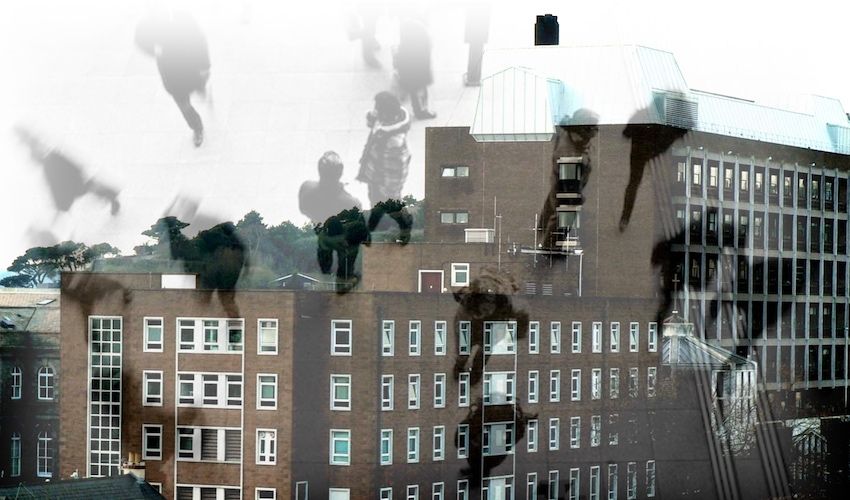


Around 750 people have been tested for covid-19 so far in Jersey as the island works through a backlog of results sent to the UK, and tries to secure its own testing facility.
Thousands of calls are coming through to the corona virus helpline each day with many people wanting a test for themselves or their loved ones - but exactly why is testing so important; who is getting tested and why?
Express answers some questions you might have about the testing process...
There are two tests for covid-19. The first is to find out if the patient has the virus at the point of testing and this is done by taking a swab from the nose or throat. These samples are then sent to a lab to be analysed for signs of the virus.
Currently in Jersey, the tests are being conducted on-island and then sent to the UK to be analysed.

Pictured: The blood test indicates whether someone has already had covid-19.
The second test is to see whether someone has already had covid-19. This is done by checking the blood for cells called ‘antibodies’ which are created when the body has to fight off an infection.
The World Health Organization’s (WHO) motto throughout the pandemic has been “test, test, test”, but, if there’s no current cure, why is it so important to test people?
The WHO have said that trying to respond to a health crisis of this magnitude without an extensive testing regime is like “fight[ing] a fire blindfolded.”
They say that testing every suspected case and then testing those who have been in close contact with if they develop symptoms is the only way of understanding the true scale of the infection.
The antibody test gives an indication of who has already had and fought off the infection and who, therefore, probably has immunity. This test is useful because it will show Governments who is able to return to work as they are no longer at risk of infection.
Jersey’s Chief Minister has confirmed that the Government is “actively pursuing” securing these kinds of tests as it will be the “start of the road to recovery” from a health and economic standpoint.
Like all jurisdictions, Jersey has its own criteria of who it will and won’t test. This is because there is a limit on how many test samples the team can send to the UK each day. Medical Officer of Health Dr Ivan Muscat has said previously that patients’ risk profile and travel history are major considerations when deciding whether or not to test.
This week, the Chief Minister has announced that 5,000 testing kits are on their way to Jersey which will be earmarked especially for testing frontline health staff.
As evidence emerges that people are catching the virus locally without the relevant travel history, many are calling for the testing criteria to be broadened.
Jersey does not yet have the equipment to test on-island and is therefore reliant on a lab in the UK. Normally, local health officials are receiving and sharing results on a regular basis, but at one-point Jersey had to wait five days for an update on its covid-19 figures.
It isn’t clear when exactly Jersey will have the facility to process tests on-island, but the Government has indicated that progress is being made on this front.
Dr Muscat initially hoped that it would be set up by the end of March, and later predictions have placed it towards the end of this month.
The first person confirmed to have covid-19 in Jersey was diagnosed on 10 March after returning from northern Italy – so why haven’t we been told about the recovery rate?
When asked this by Express at a press conference this week, Senator Le Fondré said: “In terms of the recovery side, it’s a question we’re wanting to build into the modelling side as well... because it’s not that long since this all started we’ve got to wait for the fourteen-day period, I believe, until we know they’re clear. So, those people who [were diagnosed] roughly two weeks ago are only just starting to come out of it... At the moment we haven’t been given the data as to how many people have recovered but it is something we want.”
In response to some questions submitted by Reform Jersey member Deputy Carina Alves, a spokesperson for the Health Deparment also indicated that the patient’s confidentiality was part of the reason as to why this information wasn’t being released.
Further to the email sent over the weekend, I have now had answers... Although I view some of these as inadequate.
— Deputy Carina Alves - Reform Jersey (@DeputyAlves) April 1, 2020
I have been keeping an eye on how things are progressing in Madeira & included a screenshot of their daily updates, which are public, for comparison. pic.twitter.com/Q3APfgeT5M
When the States Member asked by email “Do we have any recoveries yet? The first case was 10March,” the response she received was as follows:
“At an appropriate time, in order to protect individual patient confidentiality we will be able to provide information on outcomes.”
Comments
Comments on this story express the views of the commentator only, not Bailiwick Publishing. We are unable to guarantee the accuracy of any of those comments.